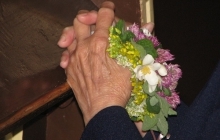A few days back, I was invited to my village to attend inauguration of piped water supply. Mandatory pooja was performed of the pipe and tap in the Grampanchayat premises. The village sarpanch applied vermillion and placed some flowers on the pipe and tap; arti was done after which the valve was opened to release the water.
This is a ritual we see so frequently, but it left me thinking on a larger issue that extends to the spiritual realm. The pipeline and the tap are, in reality, mere conduits for water. What we need is water and not the pipe or tap. Also, the water comes from a reservoir far away. However, the villagers performed pooja of pipe and tap, clearly because the latter seemed like the obvious benefactors.
Later, while chatting with the villagers, I was also told of an incident where the people in a nearby village burnt down the panchayat office because the taps in the village went dry for a few days. The above two incidents of a different kind have a common theme – ascribing false identities. The identity of a benefactor did not really belong to the pipeline or the tap, though they were instrumental in bringing water. Similarly, the identity of a culprit ascribed to the dry taps did not belong to the panchayat – so there must have been some other reason.
In our life too, we seem to assume and ascribe false identities. We tend to hold a person responsible for what he did, good or bad, when spiritual wisdom says that we are not the doers; prakriti, the divine phenomenon behind creation, is the doer. Thus, we deify someone when he obliges us in a significant way. On the other hand, if we are hurt in some way by someone’s act of commission or omission, we nurse an enmity against him.
Our concept of bodily identification, both for ourselves as also for others is, similarly, a false idea of identity. Our bodies are simply instruments or conduits through which the Creator achieves His different activities in this world in keeping with His big picture. But, because of our limited and narrow physical perspective, we do not appreciate this spiritual truth.
A conduit simply allows the water to flow through it and it does not "create" any water, nor does it "use up" any water inside it. However, since we do not appreciate that our bodily existence is like a conduit, we mistakenly believe that all actions of our bodies are ours and all our bodily "experiences" are for us. This is the cause of our grief in this world.
Sri Krishna, therefore, advises us in the Bhagwad Gita to transcend our bodily identity. He tells us to regard our life as a yagya (yaga) or sacrifice, with every action normally associated with our body being an offering in that yagya.
"Shri Krishnaa Sharanan mamah".






